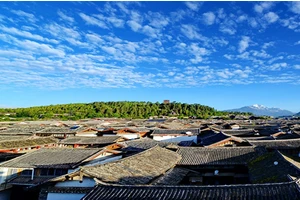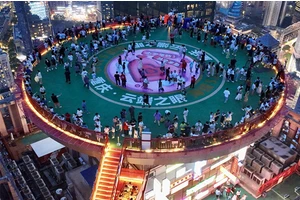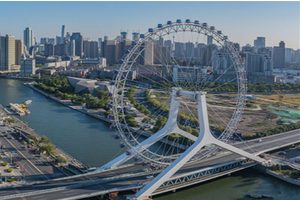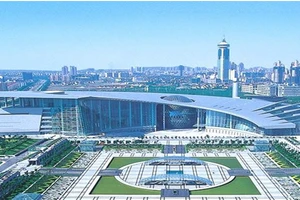He' nan Hebi tourism
Hebi City, located in the north of Henan Province, is a city with a long history and rich cultural heritage. For young people, Hebi City has many scenic spots suitable for sightseeing, which can not only meet the entertainment needs, but also increase their knowledge and experience. Here are some recommendations:
Yunmeng Mountain: Yunmeng Mountain is a tourist attraction integrating natural scenery and human landscape. With lush trees and fresh air, the mountain is a good place for hiking and mountaineering. In addition, Yunmeng Mountain has rich cultural connotations. According to legend, it is the place where Guiguzi, a famous Taoist figure in the Spring and Autumn Period, practiced. There are many relics and memorial buildings related to Guiguzi on the mountain.
Guling Mountain Scenic Area: Guling Mountain is famous for its peculiar rocks and ancient Buddhist culture. The peaks here are scattered, the rocks are in different shapes, and the scenery is pleasant. There are also many Buddhist temples and grottoes in Guling Mountain, which is a good place to learn about Buddhist culture.
Wulongkou Scenic Area: wulongkou is famous for its landscape, and there are five peaks like five dragons, hence its name. There are waterfalls, streams, lakes and other water landscapes in the scenic area, which is very suitable for taking pictures and leisure. In addition, there are some historical sites in wulongkou, such as ancient battlefield sites, which allow visitors to enjoy the beautiful scenery and feel the richness of history.
Qihe Eco-tourism Area: Qihe River is the mother river of Hebi, which is built along the river and is a comprehensive tourist area integrating sightseeing, leisure and entertainment. Here, tourists can visit the scenery on both sides of Qihe River by boat, or take a walk and have a picnic in the park by the river to enjoy the quiet and comfortable natural atmosphere.
Hebi Museum: For young people who like history and culture, Hebi Museum is a good choice. There are a large number of historical relics and artworks in the museum. Through the exhibition, we can learn about the historical and cultural development of Hebi and even the whole northern Henan.
Hongqi Canal: Although the main part of Hongqi Canal is located in Linzhou City, as a great project in the history of water conservancy in China, part of it is also located in Hebi. Hongqi Canal is not only a great water conservancy project, but also a symbol of a generation's hard work and self-reliance spirit. When you visit the Hongqi Canal, you can feel people's fighting spirit and yearning for a better life in that era.
Hebi Sports Park: For young people who like sports, Hebi Sports Park is a good place to go. There are standard football fields, basketball courts, tennis courts and other sports facilities, as well as swimming, fitness and other activities. It is a good place for young people to relax and exercise.
Qibin district Commercial Street: If you are a young person who likes shopping and tasting delicious food, you can go to the commercial street in qibin district. There are all kinds of fashionable clothing stores, special snack bars and leisure and entertainment places here, which are good places for young people to gather and enjoy urban life.
In short, although Hebi City is not as prosperous as a big city, its unique natural scenery and cultural landscape can still attract young people to visit. Visitors who like outdoor adventure or culture and history can find their own tourist destination in Hebi.
Hebi City, located in the north of Henan Province, China, is a city with a long history and profound cultural heritage. When summer is hot, there are some summer resorts in and around Hebi City, attracting tourists to enjoy the coolness. Here are some summer resorts worth visiting:
Wuyan Mountain scenic spot
Wuyan Mountain, located in the northwest of Hebi City, is a tourist attraction integrating natural scenery and human landscape. Wuyan Mountain, with its trees and fresh air, is an ideal place for summer vacation. There are many historical sites on the mountain, such as the grottoes in the Tang Dynasty and the stone carvings in the Ming Dynasty. Visitors can enjoy the charm of ancient China culture while enjoying the coolness.
Qihe eco-tourism area
Qihe River is the mother river of Hebi, which flows through the urban area, with beautiful scenery and good ecological environment on both sides. There are many scenic spots in Qihe Eco-tourism Zone, such as Qishuiguan and Qihe Wetland Park, which are good places for citizens to relax and entertain. In summer, there is plenty of water here. full of green, walking along the river or swimming by boat can make people feel a little cool.
yun meng mountain
Yunmeng Mountain, located in the south of Hebi City, is a scenic mountain area. The mountains here are green, the vegetation coverage is high, and the climate is cool and pleasant. In summer, Yunmeng Mountain is a good summer resort, where tourists can hike, breathe fresh air and enjoy the tranquility and beauty of nature.
Dapi Mountain Scenic Resort
Located in the southwest of Hebi City, Daxian Mountain is a famous mountain with a long history. On the mountain, there is the Daishan Temple, which is a Buddhist holy place with a long history and flourishing incense. In summer, with lush trees and a cool climate, Daxian Mountain is a good place for tourists to worship and escape the heat.
Hebi inner park
There are several large parks in Hebi City, such as Hebi People's Park and nanshan park, which are all good places for citizens to relax and escape from the summer. These parks are shaded by trees, with clear lakes and various recreational facilities, which are ideal places for families and friends to get together.
In a word, Hebi City and its surrounding areas are rich in natural and cultural resources, and there are many summer resorts for tourists to choose from in summer. Whether you like natural scenery or human landscape, Hebi has a summer destination suitable for you. Here, you can enjoy the cool climate and feel the charm of China traditional culture.
Prev: Diary of Tourism Mount Tai
Next: Shandong summer tourism






